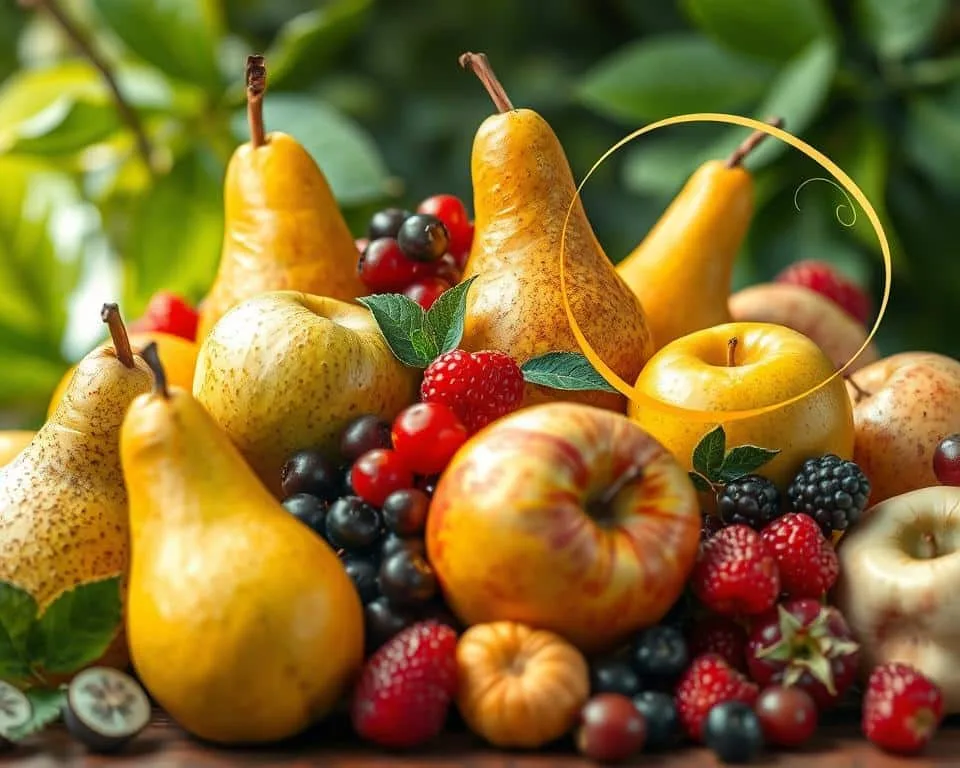Eating high-fiber fruits is key for good digestion. Adding raspberries, pears, and apples to your meals boosts your digestive health. This is because of their high dietary fiber. The USDA National Nutrient Database shows that raspberries and blackberries have about 8 grams of fiber per cup. A medium pear has almost 6 grams, and an apple with its skin has around 4 grams.
Dietary fiber is crucial for a high-fiber diet. It helps with regular bowel movements and is a natural fix for constipation. By mixing different fiber-rich fruits into your diet, you can easily meet your fiber needs. Remember to slowly increase your fiber intake. Also, drink plenty of water to prevent stomach upset. This way, you’ll fully enjoy the digestion benefits of fiber.
Key Takeaways
- Raspberries and blackberries offer approximately 8 grams of fiber per cup.
- Pears provide almost 6 grams of fiber per medium fruit.
- An apple with the skin contains about 4 grams of fiber.
- Dietary fiber promotes regular bowel movements and helps prevent constipation.
- Including high-fiber fruits in your diet is crucial for achieving daily fiber targets.
- A gradual increase in fiber intake, alongside sufficient fluid consumption, optimizes digestive health.
Benefits of Dietary Fiber
Eating fiber does a lot more than just help with digestion. It plays a big role in keeping your body healthy, starting with your gut. By making it easier to go to the bathroom, fiber improves your gut health. It also helps you feel full, which can lead to eating less and losing weight.

Fiber’s positives touch on more than just your gut. Check out how it lowers cholesterol and helps prevent heart disease here.
Promotes Healthy Digestion
Fiber is key for good digestion. Insoluble fiber increases stool bulk, easing its passage and preventing constipation. Soluble fiber slows sugar absorption, balancing blood sugar levels. Eating lots of fiber-rich fruits and veggies ensures smooth bowel movements and a healthy gut.
Helps with Weight Management
Eating plenty of fiber aids in losing and managing weight. Fiber-rich foods are low in calories and slow to eat, making you feel full sooner. Plus, they slow digestion, keeping you energized for longer. This helps keep your weight under control.
Supports Heart Health
Fiber is vital for heart health. It lowers bad cholesterol and overall cholesterol levels, reducing heart disease risk. Research confirms that a high-fiber diet can cut down on cardiovascular diseases. The American Heart Association recommends eating plenty of fruits and veggies to meet fiber needs, supporting your heart’s health.
Top High-Fiber Fruits for Better Digestion
Raspberries, pears, and apples are great for digestion. They add to your fiber intake and bring many other nutrients. These nutrients are good for your health.
Raspberries
Raspberries offer a lot of dietary fiber, with 8 grams per cup. They are full of seeds, which increases fiber and brings valuable nutrients and antioxidants. Check out the benefits of raspberries for health. They improve digestion and add a nutritious, sweet taste to your meals. Try them fresh, in smoothies, or on cereal.
Pears
Pears are high in fiber, with 5.5 grams each, especially when eaten with their skin. This high fiber helps with better digestion. They’re loaded with essentials like vitamin C and potassium. Pears are great in many dishes, whether eaten raw, baked, or poached.

Apples
Apples give you about 4.5 grams of fiber per fruit, if you eat the skin too. They’re rich in a soluble fiber called pectin, which helps control blood sugar and cholesterol. Apples are perfect for a quick snack or in your favorite salads and desserts. Eating apples is a smart way to improve your digestive health.
Adding raspberries, pears, and apples to your diet is a tasty way to up your fiber. They aid digestion and are good for your overall health.
Fiber Content in Fruits
Learning about the fiber in different fruits can help improve your diet. We’ll look at bananas, oranges, and strawberries. These fruits are tasty and healthy.
Bananas
Bananas are easy to find and packed with fiber. A medium banana has about 3 grams of fiber, good for digestion. They’re also high in potassium and have vitamins, like vitamin C.
Oranges
Oranges are known for their vitamin C and juicy taste. But they also have about 3 grams of fiber each. This fiber helps food move through your body. Plus, it boosts your immune system along with vitamin C.
Strawberries
Strawberries are both tasty and nutritious. A cup gives you 3 grams of fiber. This is great for digestion and staying regular. They’re also full of vitamin C and manganese, which are great antioxidants for your health.
How to Incorporate High-Fiber Fruits into Your Diet
Adding high-fiber fruits to your meals is easy and fun. Americans usually get about 15 grams of fiber daily, but that’s not enough. Here are easy ways to boost your fiber with tasty fruits every day.
Smoothies
Smoothies are a fun way to enjoy fiber-rich fruits. Mix berries like raspberries and blackberries with a banana and some greens. This mix is full of nutrients and good for your digestion. One cup of raspberries has 8 grams of fiber. Adding a medium banana adds another 3.06 grams of fiber. These smoothies help you meet your fiber goals and taste amazing.
Salads
Fruit salads are great for adding more fiber. Mix strawberries, raspberries, and oranges for a flavorful dish. One cup of blackberries has 7.63 grams of fiber. One large orange adds 4.42 grams of fiber. Fruit salads make your meals more exciting and nutritious.
Snacks
Snacks with lots of fiber are easy to take with you. Try apple slices with nut butter or pear wedges with cheese. One medium pear has 5.52 grams of fiber. These snacks help you meet the recommended 25 to 30 grams of fiber daily.
Small changes can greatly increase your fiber intake. Smoothies, fruit salads, and snacks make it simple. Adding high-fiber fruits to your diet is both easy and enjoyable.



